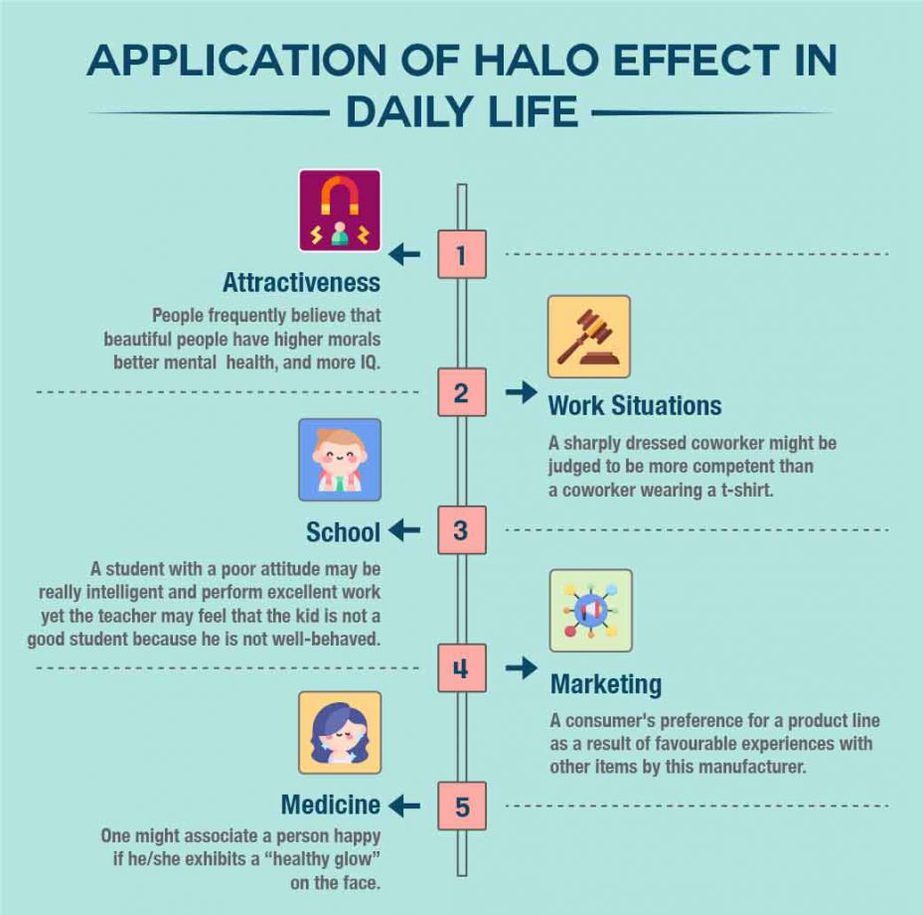The halo effect is a concept, referring to the cognitive bias that claims that positive impressions of people, brands, and products in one area positively affects human feelings in another area as well.
What Is Halo Effect?
The halo effect is described as a cognitive bias that is applied when judging a person or a particular product. Such judgments about a particular person’s character or any product are influenced by an overall positive impression about the person or the product. ”It is a well-defined social-psychology aspect that provokes individuals to act biased in regards to their judgments by transferring their opinions about one attribute of something to other unrelated attributes” explains Mind Help. It is also referred to as the “physical attractiveness stereotype”. Physical appearance is a significant part of this effect as people who are considered attractive tend to be rated higher in regards to their other traits as well.
When it comes to making first impressions, recognizing an attractive feature initially in the form of beauty or strength makes it difficult to change or revise our opinion about the same person based on new or opposing information. According to a 2016 study 1 Talamas, S. N., Mavor, K. I., & Perrett, D. I. (2016). Blinded by Beauty: Attractiveness Bias and Accurate Perceptions of Academic Performance. PloS one, 11(2), e0148284. https://doi.org/10.1371/journal.pone.0148284 . “The ‘attractiveness halo effect’ in which desired personality traits are ascribed to attractive people over unattractive people seems to influence the use of attractiveness as a cue when attempting to accurately perceive health or intelligence in faces and is in turn, limiting people’s accuracy.”
For example, an attractive person may also be seen as charming, ambitious, or funny, whether or not that evaluation is accurate. Thus, when a person is observed through the lens of the halo effect, the person’s positive feature covers the rest, irrespective of the fact whether it is the same in reality. In other words, when the known personal characteristics radiate a positive halo (hence the term halo effect), it influences one to exact the same from other, unknown qualities. For example, if someone holds a positive impression of his/her colleague because the person is well-groomed, that person will be considered competent enough to carry out other tasks, such as organizing the office party, whether they have any organizational skills or not.
Understanding Halo Effect
As mentioned previously, the halo effect refers to the general human tendency catering to the formation of impression. It is assumed that once a person possesses some positive or negative characteristic, the other unknown features are also assumed to be positive or negative or consistent with the existing impression. This phenomenon is triggered by various positive traits and is strongly linked with first impressions. It must be noted that of all, physical attractiveness is a common constituent in the halo effect, as someone who is observed attractive, the same person will be assumed to possess other positive personality traits and abilities.
Furthermore, confirmation bias strengthens the halo effect. In other words, once a positive opinion is formed about a person or a product, positive interplays with that person or product are seen to augment favorable opinion while the negative interactions are often disregarded.
An example of the halo effect is in a job interview. Consider an interview situation where a candidate is likely to get hired because he/she appears attractive and friendly to the employer. Thus, the employer will judge the candidate by associating those external positive qualities with intelligence, capability, and talent. In this case, the employer may not consider the fact whether the candidate actually has those skills or capabilities.
This same concept is used by advertisers and marketers as they take advantage of the halo effect in their promotions. One popular way of doing it is getting their products/services endorsed by celebrities. Thus, when consumers see the same, they find the product more desirable because of the celebrity’s popularity. Also, websites offering free shipping is yet another common way of using the halo effect as the promise of free shipping puts the products in a positive light.
However, the halo effect can also occur in a negative way and it is called the devil horns effect 2 Sundar, A., & Kardes, F. R. (2014). (PDF) Inferences on negative labels and the horns effect. ResearchGate. https://www.researchgate.net/publication/287811361_Inferences_on_Negative_Labels_and_the_Horns_Effect . This is the opposite of the halo effect, whereby negative characteristics about a person or a product makes the overall aspect of the subject look less attractive.
Read More About Confirmation Bias Here
History Of Halo Effect
The term halo effect was first coined in 1920 by psychologist Edward Thorndike in his paper titled “A Constant Error in Psychological Ratings” 3 MIT – Massachusetts Institute of Technology. https://web.mit.edu/curhan/www/docs/Articles/biases/4_J_Applied_Psychology_25_(Thorndike).pdf The paper was based on a study where commanding officers were asked to rate their soldiers based on certain characteristics. He discovered that the ratings of soldiers’ physique were positively correlated with those for intelligence, leadership, and character, despite being unrelated characteristics. Thus, Thorndike found that when people were asked to assess others based on a series of traits, a negative perception of anyone trait would drag down all the other trait scores.
Application Of Halo Effect In Daily Life

While for most, the halo effect is a new term, it is present in almost every aspect of our day to day life. Such situations include:
- Finding someone attractive
- Workplace
- School
- Responding to marketing campaigns
- Medicine and healthcare
The following aspects are explained below:
1. Attractiveness
Given the fact that the halo effect primarily determines first-impressions based on physical appearance, it explains the theory of human attractiveness to other people. The exaggerated phrase, “love at first sight,” is often associated with a positive physical appearance that can also make one convinced of other positive things about that person.
2. Work Situations
The halo effect is prevalent at workplaces as well. It is generally perceived that a formally dressed coworker has a good work ethic while another co-worker who is casually dressed lacks the same work ethic. However, in reality, this can be completely untrue. The same effect is noted at the educational level. A 2011 study on a university level tested student’s perceptions of both a high-ranking professor and a guest lecturer. Based on these titles, the students exhibited positive associations with the higher ranking academics that simply were not true, including a taller height.
3. School
The concepts of first impressions, personality, and knowledge can also kindle the halo effect in schools. For example, a 2016 study states that perceived attractiveness can lead to higher grades in school. However, other studies show no such correlation. There is another example in regards to higher academic achievement possibly being linked to name familiarity. In one study, teachers graded essays written by fifth-graders. The teachers gave higher grades to essays written by students possessing well-known, popular, and attractive first names versus essays by students with rare, unpopular, and unattractive names.
4. Marketing
It is a known fact that brands and marketers go into taking extensive measures to manipulate consumers so that they buy the products or services. They can even use the halo effect. The way brand labels and markets their products also determine whether consumers are drawn towards the product. For example, a food study published in Food Research International 4 Schouteten JJ, Gellynck X, Slabbinck H. Influence of organic labels on consumer’s flavor perception and emotional profiling: Comparison between a central location test and home-use-test. Food Res Int. 2019 Feb;116:1000-1009. doi: 10.1016/j.foodres.2018.09.038. Epub 2018 Sep 18. PMID: 30716882. labeled the same food products (yogurt, potato chips, juice) “organic” or “conventional.” The “organic” products received higher ratings overall, and consumers were willing to pay more.
5. Medicine
Unfortunately, the halo effect also plays a role in the field of medicine. A physician, for example, might perceive a patient based on appearances without carrying out any test at first. It’s also conceivable to judge someone’s well-being based on the first impression. For instance, one might associate a person happy if he/she exhibits a “healthy glow” on the face. Another example can be associating someone who is skinny as someone who has perfect health, or vice-versa. A 2016 study conducts a review that goes as far as to say that “attractiveness suppresses the accurate recognition of health.”
Advantages & Disadvantages Of Halo Effect
There are a couple of advantages and disadvantages of the halo effect. The following are mentioned below.
1. Advantages of Halo Effect
To begin with, everyone desires to be an attractive person that is well thought of. An attractive person receives special treatment simply because people tend to like them more. At work or school, the prettier the person, the more attention he/she is likely to receive. This may result in better performance with a better outcome.
Another advantage, in general, is that the halo effect is a type of heuristic or mental shortcut. It enables individuals to make quick decisions about others without having to spend a lot of time understanding their behavior. Although this method saves one time and effort, it can certainly result in false impressions.
2. Disadvantage of Halo Effect
Ironically, the disadvantage of the halo effect is associated with preferential treatment given to beautiful people. While it may be beneficial for the attractive person, it is a disadvantage for everyone else because it can result in significant inequality. Being passed over for someone else at work or school is bad enough, but sometimes the preferential treatment can even affect someone’s life.
Importance Of Halo Effect
It is important to have an awareness of the halo effect to help us understand how it affects the different aspects of our lives. Whether we are trying to evaluate another person or deciding to vote for a political candidate, we must consider how our impression about a particular thing might change our evaluations of other characteristics. However, it must be noted that while being aware of the halo effect does not eliminate the bias from our lives, it can certainly help to enhance or promote our objective decision-making abilities.
Read More About Decision-Making Here
Be Aware Of The Halo
Most of us experience the halo effect on a daily basis. We end up judging a person, a product, or a brand based on a single attribute while overlooking the rest. Thus, being conscious of this phenomenon can help us break such a subjective cycle. However, it does not mean that humans will be able to avoid its influence on their perceptions and decisions. The effect is just one of many prejudices that allow people to make quick decisions but also contributes to errors in judgment.
Halo Effect At A Glance
- The halo effect is described as a cognitive bias that is applied when judging a person or a particular product.
- The halo effect refers to the general human tendency catering to the formation of impressions.
- Confirmation bias strengthens the halo effect.
- It is important to have an awareness of the halo effect to help us understand how it affects the different aspects of our lives.
- Most of us experience the halo effect on a daily basis.










